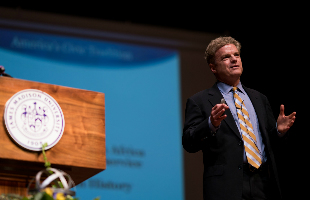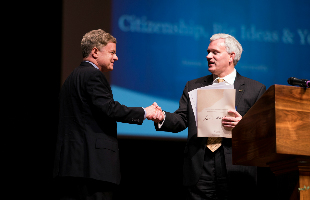What is your scratch on history?
The legacy of service
Nation and WorldSUMMARY: Madison Vision Series presenter John Bridgeland spoke on the fundamental role of service in America and the opportunity that each of us has to get involved more fully as citizens.
On the eve of Constitution Day, John Bridgeland, founder and CEO of Civic Enterprises and vice chair of the Service Year Alliance, spoke on the fundamental role of service in America and the opportunity that each of us has to be more fully involved as citizens. Bridgeland’s presentation kicked off the 2016-17 Madison Vision Series.
 Having served in two presidential administrations — as director of the White House Council on Domestic Policy and director of the USA Freedom Corps under President George W. Bush; and director of the White House Council for Community Solutions under President Obama — Bridgeland discussed service not as a partisan idea, but an American one.
Having served in two presidential administrations — as director of the White House Council on Domestic Policy and director of the USA Freedom Corps under President George W. Bush; and director of the White House Council for Community Solutions under President Obama — Bridgeland discussed service not as a partisan idea, but an American one.
From the nation’s founding, service has been held up as an ideal. Bridgeland quoted George Washington saying, “We ought to put service at the center of what it means to be an American.” James Madison, in addition to being the fourth president of the United States, served in a militia during the Revolutionary War, was a key writer and influencer at the Constitutional Convention and assisted in the Louisiana Purchase. Service, Bridgeland explained, adds to the collective happiness of the nation and what it means to be an American.
With growing partisanship and talk of a divided nation, Bridgeland believes that national service can be the big idea that brings us together. He described a surge of national service projects, beginning in the 20th century, across administrations:
- In the midst of the Great Depression, President Franklin D. Roosevelt established the Civilian Conservation Corps, in which 250,000 young men — white, black, rich and poor — helped build national parks, planting over 30 million trees and protecting thousands of acres.
- While on the campaign trail at the University of Michigan, President John F. Kennedy put forth the idea of an organization to send Americans out into the world to serve, which later became the Peace Corps.
"The american spirit of voluntary service...a spirit that flows like a deep and mighty river running through the history of our nation."
President Ronald Reagan
- After declaring his war on poverty in the 1960s, President Lyndon Johnson set up Job Corps, Head Start and VISTA to help nonprofits serve their constituents.
- President George H. W. Bush started the Points of Light Foundation, one of the largest volunteer organizations in the world today.
- President Bill Clinton proposed the idea of civilian service as a way to pay down student loan debt, now known as AmeriCorps.
- After 9/11, President George W. Bush created the USA Freedom Corps.
- Soon after assuming office in 2009, President Barack Obama signed the Edward M. Kennedy Serve America Act which expanded the AmeriCorps program.
Although government has played a role, “The beginning of the story was typically not government,” Bridgeland said, “but individual citizens who had a belief in themselves, then acquired the knowledge and the skills, and had enough faith to understand that they could literally change the world.”
He cited Sylvia Earle, director of the National Oceanic and Atmospheric Administration, who is working to create Blue Parks to protect marine life; Ray Chambers, a businessman and philanthropist working to end and eradicate malaria in Africa; and Gen. Stanley McChrystal, who is currently the chair of the Service Year Alliance, whose goal is to grow the number of national service positions from 65,000 to 1 million in the next decade.
 |
| "I have a vision of what it means to educated in America is this idea of serving your community, your country and your world." -Jonathan Alger, JMU President |
To further this goal, Bridgeland approached James Madison University President Jonathan Alger and The College of William & Mary President Taylor Reveley to invite private and public colleges and universities in Virginia to commit to the Virginia Compact for the Service Year. More than 250 colleges across the country have accepted this challenge initiative.
Bridgeland emphasized that citizens can serve in big and small ways. “You can mentor a student, clean a park, help in a soup kitchen or go across the world to fight malaria in Rwanda. How can you use your skills and your passion to benefit the nation? What will be your scratch on history? Washington and Adams had a saying, ‘If we do these things and work hard, we cannot ensure success, but we can deserve it.’”

